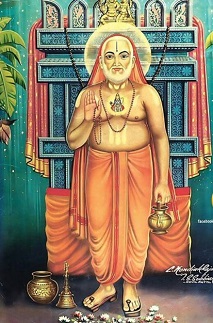Search for any aspect about Guru Sri Raghavendra Swamy’s life in Google as saint, scholar, theologian, mystic, reformer and you will find over 30lac search results for each search query , today. There is a significant and voluminous amount of literature, scholarly texts and authored titles which talk about the life and times, the significance, the accomplishments, relevance and above all, the magnanimity and powers of Guru Sri Raghavendra Swamy.
Even today, he is a saint, who is considered and worshipped as a God amongst his ardent devotees. He was also known as Sudha Parimalacharya. He was born as Sri Venkata Natha, the second son of Sri Thimanna Bhat and Smt. Gopikamba at Bhuvanagiri, near present-day Chidambaram in Tamil Nadu. He served as a pontiff at the Kumbakonam Matha from 1624 – 1671.
Guru Raghavendra Swamy was a follower of the Dvaita philosophy and was lovingly called Guru or Rayaru. Even today, his name, his spirit and soul are synonymous with benevolence, large-heartedness and generosity. His name bespeaks the innumerable miraculous experiences devotees have had either directly with him or with a prayer.
In the Hindu tradition, Gods or forms of Gods are associated with typical characteristics as for instance, Lord Ganesha is considered as the remover of obstacles. Raghavendra Swamy is one saint-God who is associated with multiple forms of life-giving benevolence. Devotees even to this day believe, that he grants all wishes to the sincere and ardent followers.
Amongst the saint’s multiple facets, it is well-known that Raghavendra Swamy was fond of traditional and devotional music, and was a renowned Veena player, composing several songs under the name Venu Gopala. The Guru has been eulogised by Narayanacharya in his contemporaneous biography ‘Raghavendra Vijaya’ and a hymn ‘Raghavendra Stotra’ by Appannacharya. He is also regarded as a saint known for preaching the worship of Vishnu regardless and unconditional of caste or creed.

